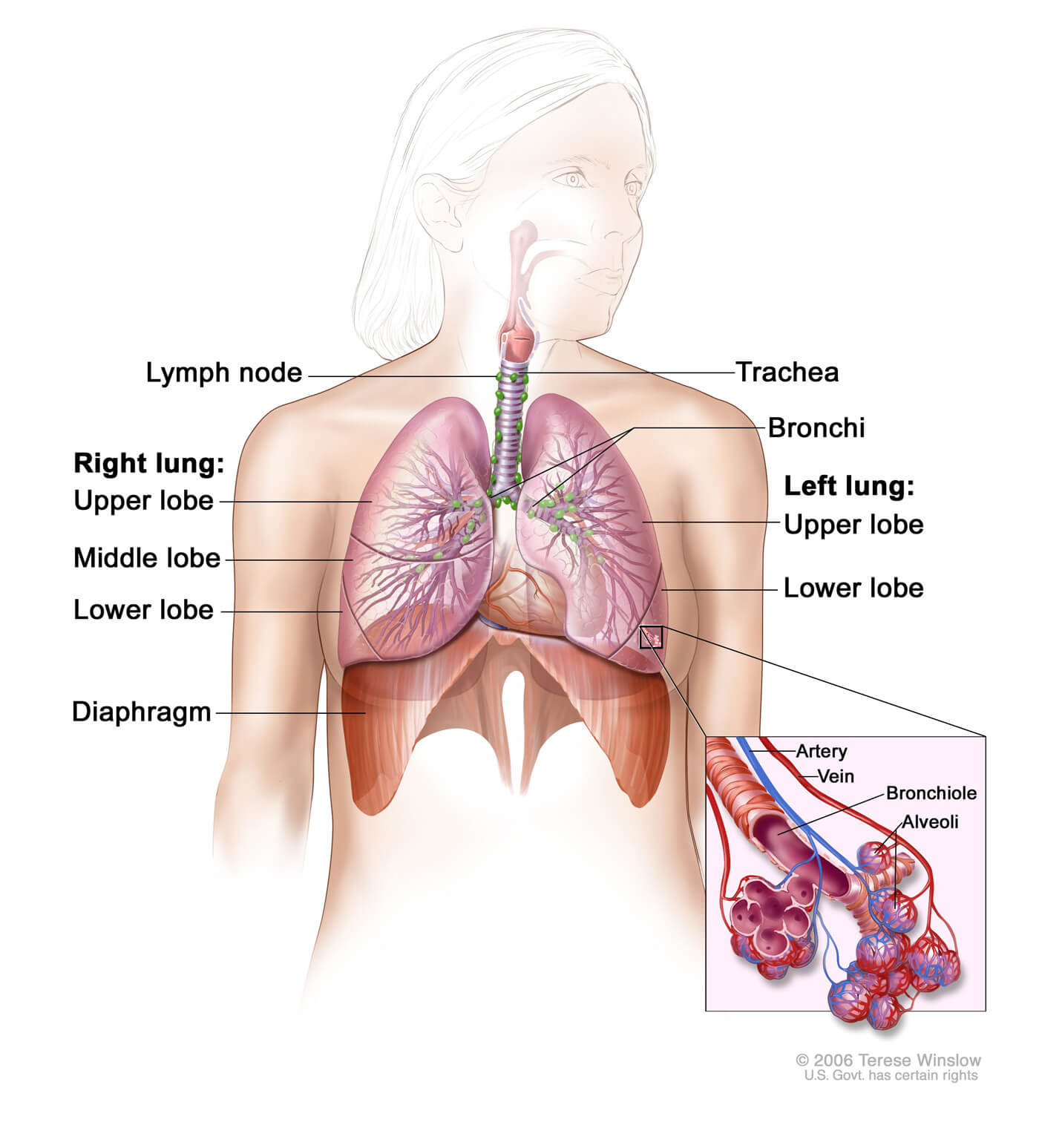Cancer happens when cells in the body begin to grow out of control. When this occurs in the lungs, it is called lung cancer.
The lungs are a pair of cone-shaped breathing organs in the chest. The lungs bring oxygen into the body as you breathe in and release carbon dioxide, a waste product of the body’s cells, as you breathe out. Each lung has sections called lobes. The left lung has two lobes. The right lung is slightly larger, and has three lobes. A thin membrane called the pleura surrounds the lungs. Two tubes called bronchi lead from the trachea (windpipe) to the right and left lungs. Tiny air sacs called alveoli and small tubes called bronchioles make up the inside of the lungs.

More people die from lung cancer than from any other type of cancer. Lung cancer is the second most common cancer in the United States, after skin cancer. The number of new cases and deaths from lung cancer is highest in Black men.
There are two main types of lung cancer: small cell and non‐small cell. Although both occur in the lung, these grow very differently and are treated differently. Non‐small cell lung cancer is the more common of the two and has many subtypes including adenocarcinoma, squamous cell carcinoma, and large cell carcinoma.
At present, the only recommended screening test for lung cancer is low‐dose computed tomography (also known as a low‐dose CT scan, or LDCT). An x‐ray machine scans the body with low doses of radiation in order to create detailed pictures of the lungs. The United States Preventive Services Task Force updated their lung cancer screening guidelines in March 2021. They now recommend annual screening with LDCT for individuals between 50 and 80 years who have a 20 pack-year smoking history and currently smoke or have quit within the past 15 years. Therefore, an adult aged 50 or older who smoked an average of one pack a day for 20 years, or two packs a day for 10 years, or any combination that equals 20 pack-years or more, is eligible.
Lung cancer (all types combined) is the second most common cancer in both men and women and accounts for 18% of all new cancer cases diagnosed in West Virginia. Every year in WV, approximately 2,047 people are diagnosed with lung cancer and 1,460 will die from the disease. Half of all people with lung cancer diagnoses have distant metastasis, meaning the cancer has spread. Due to this, more people die of lung cancer than colorectal, prostate, and breast cancer combined.
In the United States, cigarette smoking is linked to 80% to 90% of lung cancers, making it the number one risk factor for the disease. Other factors include secondhand smoke, radon, other substances and pollutants (including asbestos, arsenic, diesel exhaust, and some forms of silica and chromium), personal family history of lung cancer, previous radiation therapy to the chest, and possibly diet.
Most lung cancers can be prevented as these are connected to smoking, secondhand smoke, or exposure to radon or other environmental factors. Lung cancer screening using LDCT can help find lung cancer at an earlier stage when it is most treatable, thus improving quality of life and increasing life span for lung cancer survivors.
In North Central West Virginia Lung Cancer Screenings are available at United Hospital Center in Bridgeport. You will need a referral from your physician to schedule a test. Your provider will contact UHC at 681-342-1300 to schedule your test.
Please note, the information provided throughout this site is not intended or implied to be a substitute for professional medical advice, diagnosis or treatment. All content, including text, graphics, images, and video, on or available through this website is for general information purposes only. If you are experiencing related symptoms, please visit your doctor or call 9-1-1 in an emergency.

